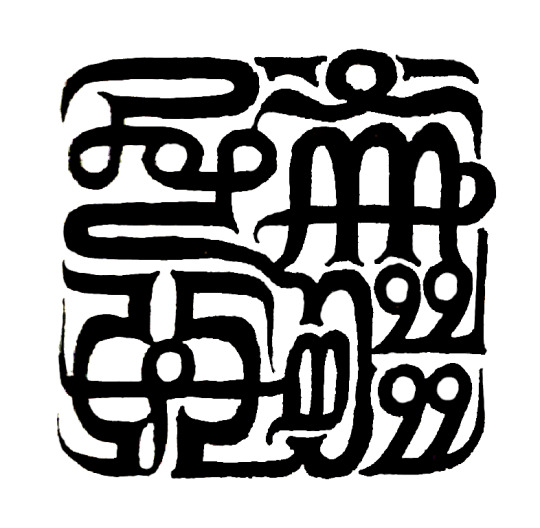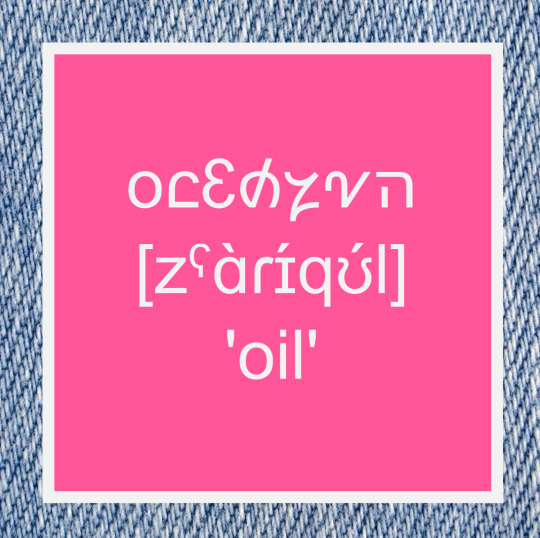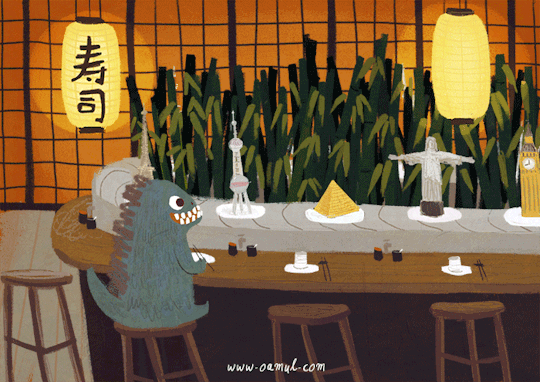It's everything you've been waiting for, the Let's Have a Bouba Tumblr!There's nothing here? Surprise! Brat girl summer under way.
Don't wanna be here? Send us removal request.
Video
translation: “My sheep! [bah! bah!] You are my life. [bah! bah!] Walk behind me…[bah! bah!] Sing (after me).”
262K notes
·
View notes
Photo

*goes to slovenia* *strolls around lake bled* *theres skateboarders* hmm this makes me think of elephants that use giant oiled seed pods as a means of locomotion
2K notes
·
View notes
Text

huge shout out to this little kid for writing my favorite poem
139K notes
·
View notes
Text
Makes me think of a Korean term a friend taught me the other day: 우문현답 umunhyeondap
Basically it means 'silly question, wise answer'
In this case it was the following:
-- What makes a cake excellent?
-- You must eat more to find out.

The wise ask
Chit xik kûy hyat Literally “Wise ask, foolish answer” (Read top to bottom and left to right)
This belongs to a specific genre of highly terse, compressed Tepatic sayings consisting of typically only four glyphs. It can be considered a truncated form of the longer, grammatical sentence:
Yaq chit ti xik lon, yaq kûy ti hyat lon

Which may be translated “A wise person has many questions, a fool has many answers.”
In other words: Shut up.
59 notes
·
View notes
Text

https://en.m.wikipedia.org/wiki/Proto-Austronesian_language
19 notes
·
View notes
Text

Found several packs' worth of pokemon cards strewn across a target parking lot and took a pic to show my friends without realizing how much my outfit elevated the scene to "aftermath of a wizard duel"
114K notes
·
View notes
Text
at the company holiday party and a buddy proposed "suicide via throwing yourself into the alligator moat at the Bass Pro Shop Pyramid, irrevocably changing the lives of dozens of horrified onlookers" as the coolest way to die which was the most inspired thing i've heard in a while
18K notes
·
View notes
Text

We're going to end our Bratcember Lexember with another full translation, but we couldn't have got here without all of you who have joined us at Let's Have a Bouba this year. We have produced something which depended on the contributions of so many people. First and foremost - Jonathan @mindutme! We depended on you a lot and the amazing font work you did get us through this Lexember far more easily than last year. Also thank you to our Patrons who mean that we aren't worrying about being able to pay for the software we use to stream. Your support means the world to us.
So, for a final final word, thank you! (or as Miles would say, yinz). Gnátannyo refers to leaning to one side due to the burden of favour owed to the person being thanked, in the way obrigado/a in Portuguese refers to the thanker rather than the thankee. We owe all of you a lot, so come with us as we continue with N'asibómmó next year.
8 notes
·
View notes
Text

Let's start (if you are reading this in sentence order rather than post order) with the conlanging bit of the translation.
When we were trying to come up with a word for 'confusing' the idea of 'saljejǐ' first came up. To negatively or involuntarily keep thinking about something. Lexember falls at a time when for many queer folk, and as such for many conlangers, tensions can get quite high. Lexember is a real push, but it also shows us that we are part of this wider conlanging family.
You'll notice a lot of 'kpa' and this is by design. In going through which sounds had come up and which hadn't (particular when showing off Sutan, our script) we realised kp hadn't featured yet. Its root *kwa means day, and deriving a word for 'time' from this gave us a lot of kpa in a short text.
kpaɡî - day.COLL - all the time
mil'ón'akún kpammon - running out of time - here kpa is in the genitive case. The system of nominalisation to work in place of subordinate clauses has been interesting and marked a subtle change from the Yaatláw system.
kpashá - this is a modal adverb indicating a possible negative event in the future. It probably needs defining better, but in its original sense it refers to a future storm, ready to wreak havoc when it comes.
Running out of time - of course it's not the same getting to the end of Lexember as having a baby but we feel you Charli! We almost didn't have time to squeeze in this last song from brat, but Jake couldn't let this one pass. It's no club classic, but it speaks to getting older and realizing that there are some experiences the people around us are having that we simply can't know without experiencing them ourselves.
At LHAB '[we're] exactly the same but [we're] different now' - we've been in Conlang Conflict, the YouTube relay (so many views!) and we have Patrons who keep us accountable in our conlanging and content creation. LHAB is recently employed, booked and busy, but excited to go into 2025 with a new relay, big plans for Bouba Babble and who knows what else.
9 notes
·
View notes
Text

We've actually got to day 365! In some ways this isn't a great Lexember entry - we had worked out how numbers worked weirdly early, as LHAB is want to do. However, we have both given bountifully and at some point needed to do a little number moment.
N'asibómmó uses a base 20 system, with a sub-base of 5. Relative to the rest of the language, this is one place where the derivation of the numbers occurred before the first true sound changes from roots, creating series like mzo (5) maz'ú, (6) mas'al, (7) mzî, (8) mdo. Thus suggested that this number system was well developed already and we have kept it quite stable over time.
Gboró ksǔ mzo breaks down as follows, with the numbers in brackets in decimal: gboró (19) x ksǔ (20) + mzo (5).
At some point we should work out a numeral system for the script, but for now see them written out in all their glory.
#conlang#letshaveabouba#conscript#lexember#linguistics#nasibommo#neography#worldbuilding#bumpin that
12 notes
·
View notes
Text
Excited to see how it turns out!
okay so I think the Ngįout document is like 80% done - all I have left is to finish the example sentences, and to rework the section about the orthography.
I'm also toying with a new conlang I'm currently calling Kshâtá /kʂɑ́.tʌ́/, which is based on the alt-evolution post I made a few months ago about the LHAB protolang. Not much has stayed the same, but hey credit where credit's due. Currently it's just a phonology but I have a bit of potential grammar vibes floating around in my head. I also at one point want to addapt Akka-tą́ (Ngįout's script) to it, because it sounds like a cool challange and also I don't really feel like coming up with a new script lol
5 notes
·
View notes
Text

Welcome to the last and final week of Lexember 2024! No Sabrina love for this short and sweet week, but will round it out well with her Powerpuff Girl friends.
To be honest, it has taken me (Miles) a while to embrace the pop music of today. My hipster roots forbade it, so for a while, Chappell was really a Guilty Pleasure for me, just like the final track of Rise and Fall of a Midwest Princess.
For this word, the nominalization suffix, -n'a, is used with the verb ‘klâ – to like.’ The vowel of the root is rounded as a result of the nominalization to produce ‘klón'a – pleasure”
2 notes
·
View notes
Text

The journey to get to padzubo is a long one, so forgive the cutting to the chase. We have a lot of ground to cover.
The root of the word is pádzu, which comes from a name of a place, Páddzu, in the Yoshimma speaking land (a relative of Yaatláw and Kongwa).The place produces an orange pigment, and as such the name pádzu has been adopted as a term for orange things. This then had the -bo suffix, representing the small round pieces amber is commonly found in.
4 notes
·
View notes
Text

I don't think I (Jake) had ever heard a cicada until I visited Japan in the summer, and realised that in anime when they played those noises they were actually representing something real. On the flip side, I (Miles) had two broods hatch in my life and the sound is hauntingly present.
The sound of cicadas is so iconic that to come up with a word we tried to replicate the noise of the cicadas. While we don't have a lot of onomatopoeia in the language, this is one case where the symbolism made a lot of sense.
3 notes
·
View notes
Text



For the first time since 2005 today (read "yesterday") marks both Christmas and the first day of Channukah which while both starting on fixed days in their own calendars do not usually coincide.
To represent Channukah we went with a word for oil, one of the key parts of the symbolism of Channukah's eight days and nights. It is derived from the root for olive and a new liquid classifier, -qul, which comes from a word for water. It makes bouba class nouns, as liquids laterally form bouba shapes in most instances.
For Christmas we went with the idea of giving. We're presenting two forms derived from a root qarî 'to give' coined in honour of Mariah Carey herself. The first is qarínyo, taking a modifier describing movement out and away, derived from 'to sail' as we are leaning into the seafaring idea in these. The second is qarítun, which uses a companion modifier to -hâ as in knur'â from Day 22. Hâ from 'to sink' was clearly quite negative in association, so we coined the companion 'tun' from 'to dive'. It was almost 'ton' for Tom Daley but it might have been a little too on the nose. It can serve simply as a directional but also as an intensifier, as in some slang usage of 'down'. Qarínyo is thus to give something away, but qarítun is to give a lot, to be generous, to be giving.
Finally, just to say that we know that today won't be one of light and gifts for everyone, and we hope anyone reading this knows that LHAB is a place for everyone in a big conlanging family.
3 notes
·
View notes

